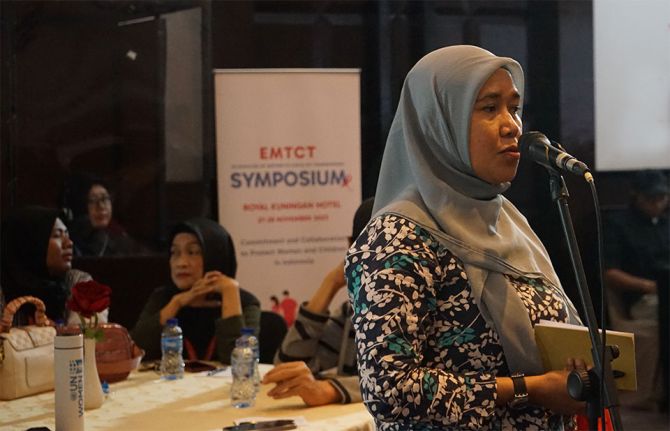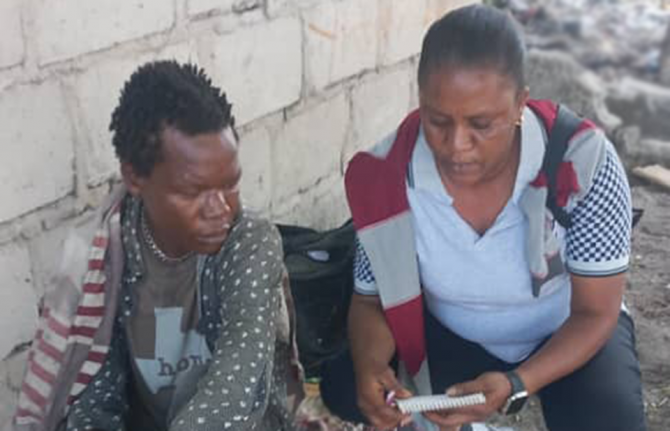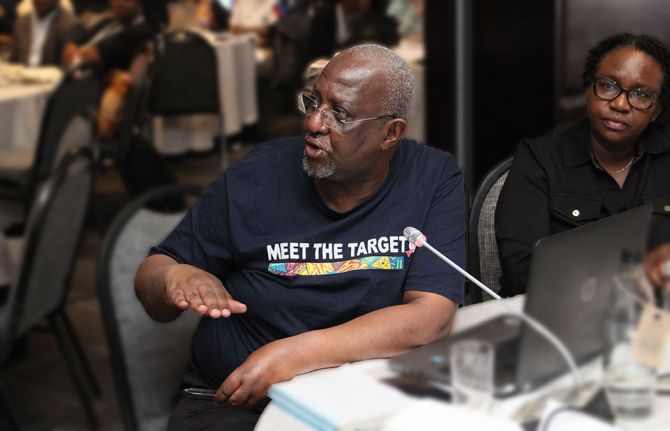
Feature Story
Linking maternal and child health to AIDS ahead of G8 Summit
01 June 2010
01 June 2010 01 June 2010
UNAIDS Deputy Executive Director for Management and External Relations, Jan Beagle, delivered the keynote speech at an event for Canadian Parliamentarians. 25 May 2010.
Canada will host the annual summit meeting of heads of government of the Group of Eight (G8) countries in Huntsville, Muskoka from 25 to 26 June 2010. The Muskoka Summit aims to deliver the ambitious commitments made at the G8 summits since 1997 related to health, development, the environment, security and good governance.
The G8, which is composed of governments of France, Germany, Italy, Japan, the United Kingdom, the United States, Canada and Russia, met last year in Italy and reaffirmed existing commitments on global health, including US$60 billion for health over 5 years, 100 million malaria bed nets by 2010, and universal access to HIV treatment by 2010. A Global Consensus on Maternal Health was also adopted, which includes support for free services for women and children where countries choose to provide it. The first G8 accountability framework was published, showing individual country progress against some key G8 commitments.
Reducing the number of children who die before the age of five is the fourth Millennium Development Goal (MDG 4), while doing the same for mothers during pregnancy or childbirth is the fifth goal (MDG 5). These two Goals are often referred to as the health related MDGs along with the response to AIDS, malaria and other diseases. These three MDGs are closely interlinked and recent data has shown how HIV has prevented further progress in improving maternal health and reducing child mortality.
According to a recent study to assess progress towards MDG4, mortality in children younger than 5 years has dropped from 11.9 million deaths in 1990 to 7.7 million deaths in 2010 worldwide. A similar study focusing on MDG 5 estimates that there were 342.900 maternal deaths worldwide in 2008, down from 526.300 in 1980. The study also highlights that there would have been 281.500 maternal deaths worldwide in 2008 in the abscence of HIV.
Maternal and child health and AIDS
Ahead of the G8 Summit and to highlight the important link between the 2010 G8 focus on maternal and child health and previous G8 commitments to the AIDS response, UNAIDS Deputy Executive Director for Management and External Relations, Jan Beagle, delivered the keynote speech at an event for Canadian Parliamentarians. The event, hosted by the Canadian Federation of Nurses Unions (CFNU) took place in Ottawa on 25 May and was attended by parliamentarians, health officials, civil society representatives and several African Ambassadors. CFNU represents 158.000 nurses and student nurses and regularly holds events for Members of Parliaments on health and public interest topics.
In her address, Ms Beagle stated that the Joint UN Programme on HIV/AIDS (UNAIDS) was encouraged by the sharp focus of the Canadian G8 Presidency on child and maternal health.
“As HIV is the leading cause of death among women of reproductive age, the global response to AIDS can and must be leveraged more effectively to meet women health needs,” said Ms Beagle.
She noted that the Muskoka initiative is in line with the UN Secretary-General’s global Joint Plan of Action focusing on the health of women and children which was launched in April 2010.
Ms Beagle called for an integrated approach to all the Millennium Development Goals and highlighted that MDG 4 and 5 cannot be accomplished without a strong commitment—and real action—on universal access to HIV prevention, treatment, care and support.
Prevention of mother-to-child transmission (PMTCT) programmes provide a platform for integrated service delivery. The recent scale up of mother-to-child HIV transmission programmes enables women to receive sexual and reproductive services at the facilities where they receive PMTCT services. Integrated services can maximize health system capacity by leveraging human resources for broader health gains.
“The focus on maternal and child health represents a unique opportunity for Canada to demonstrate to the G8 how well this ties in with G8 commitments on the AIDS response,” said Ms Beagle. “It also represents a unique opportunity to highlight to the G8 the importance of accountability and monitoring of progress on previous commitments”.
Linking maternal and child health to AIDS ahead o
Feature stories:
During Winter Olympics, UNAIDS calls on Canada to ensure G8 delivers on universal access (28 February 2010)
Speeches:
External links:
G8 summit 2010 official website
Canadian Federation of Nurses Unions
Related

Feature Story
World Bank hosts series of high-level debates on changing dynamics of the AIDS epidemic
28 May 2010
28 May 2010 28 May 2010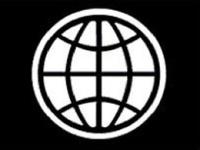
The World Bank's Global HIV/AIDS Program is hosting a series of high-level debates on the constantly changing dynamics of the AIDS epidemic.
With leading donor countries emerging slowly from economic crisis, development aid flows are under heavy pressure. There are indications from some bilateral agencies that their AIDS funds may have to be reduced this year. Others, including the Global Fund to fight AIDS, Tuberculosis and Malaria, are seeking “efficiency gains” and carefully examining ways to prioritize technically sound grant proposals in situations where country demand may exceed available grant resources.
The global crisis is affecting many countries’ plans for reaching universal access to HIV prevention, treatment, care and support. In this scenario, The World Bank's Global HIV/AIDS Program and the Office of HIV/AIDS at the United States Agency for International Development (USAID) are hosting a series of high-level debates on the constantly changing dynamics of the AIDS epidemic.
This initiative aims at providing governments, development agencies, civil society organizations, communities of people living with HIV, and other partners with evidence and knowledge to achieve better results with the resources available.
The bi-monthly debate series began on 19 May 2010 at the World Bank in Washington, D.C., with a discussion on what constitutes an effective "HIV test and treat" strategy titled Test and Treat: Can We Treat Our Way Out of the HIV Epidemic?
The expert panelists will debate the issue, followed by a broader discussion. Using the World Bank’s Global Development Learning Network's video conferencing and web-based technologies, country teams in Africa and other partners will also be able to take part, and the events are also streamed live via the web.
Running until World AIDS Day 2010, upcoming topics include discussions on public health, PrEP and HIV prevention, and development coordination. The next one is scheduled for 29 June 2010.
World Bank hosts series of high-level debates on
Cosponsors:
Multimedia:
Feature stories:
The Impact of the Global Economic Crisis on HIV Prevention and Treatment Programmes
Global economic crisis and HIV (06 July 2009)
Contact:
External links:
United States Agency for International Development (USAID)
Emerging Issues in Today's HIV Response
Publications:
Impact of the global financial and economic crisis on the AIDS response (pdf, 173 Kb.)
The Global Economic Crisis and HIV Prevention and Treatment Programmes: Vulnerabilities and Impact Burkina Faso (pdf, 52.8 Kb.)

Feature Story
UNAIDS celebrates the life of Dr Sergei Furgal
28 May 2010
28 May 2010 28 May 2010
Dr Sergei Furgal
Today there are heavy hearts at UNAIDS, as we celebrate and commemorate the life of Dr Sergei Furgal – one of UNAIDS most valued staff members and a distinguished international civil servant.
A citizen of the Russian Federation, Sergei completed his medical degree and graduate studies at the Russian Military Medical Academy in Leningrad. He had an accomplished career in government service of the Russian Federation, working as the Head of the Department of International Relations of the Ministry of Health in Moscow. In this capacity, he made invaluable contributions to strengthening the close friendship and collaboration between UNAIDS and the Russian Government.
Sergei joined UNAIDS in 2005, initially on secondment from the Russian Government. In five years of exemplary service with UNAIDS, he served in various important roles, including as Director, ad interim of the UNAIDS Regional Support Team for Eastern Europe and Central Asia in Moscow, and as UNAIDS Regional Support Adviser in Geneva, responsible for government relations with Eastern Europe and the Commonwealth of Independent States.
Using his unparalleled analytical expertise and diplomatic skills, Sergei was able to successfully negotiate a number of landmark agreements on AIDS in the Commonwealth of Independent States. He also provided invaluable guidance on ensuring that the AIDS issue was high on the agendas of the World Health Assembly, the G8 and CIS Summits.
Sergei gave generously of his time to support two causes he felt about most passionately: public health and Russia. He was actively involved in the activities of the Vishnevskaya and Rastropovich Medical Foundation. Sergei volunteered his time and influence to develop and promote the Foundation’s programmes for child health care in Russia.
Sergei is fondly remembered and dearly missed by thousands of friends, colleagues and countrymen from across the Russian Federation, the Commonwealth of Independent States and across the world.
Sergei Furgal passed away earlier this month in Geneva. Today Sergei’s life is being commemorated at a memorial ceremony at UNAIDS.
UNAIDS celebrates the life of Dr Sergei Furgal
Multimedia:
Related

Feature Story
PCB delegation highlights commitment to end stigma and discrimination in El Salvador
28 May 2010
28 May 2010 28 May 2010A recent visit from a UNAIDS Programme Coordinating Board (PCB) delegation to El Salvador stressed the importance of addressing stigma and discrimination in the response to HIV in the country and commended the government of El Salvador for its leadership on these issues.
"We congratulate the efforts by El Salvador in its national response to HIV under the leadership of the government with active participation by civil society," said Dr Marijke Wijnroks, AIDS Ambassador from the Netherlands, the current PCB Chair. “We are particularly impressed with the openness on sensitive issues such as comprehensive sexuality education for young people and stigma and discrimination of key populations like MSM, transgenders and sex workers”.
The field visit, that took place from 10-14 May 2010, coincided with the launch of a Presidential Decree that prohibits any discrimination based on sexual orientation and gender identity in the public sector. The Secretary of Social Inclusion, Dr Vanda Pignato, who is also the First Lady of El Salvador, officially opened the National Directorate for Sexual Diversity during the visit, and stressed that “this Presidential Decree represents the obligation of the State in addressing the issue of discrimination."
The PCB field visit provided an opportunity for Board members to be exposed to the realities of the epidemic and the work undertaken by UNAIDS, together with its national and international partners, on the ground. Dr Menna Ould Tolba, Delegate of the PCB and Coordinator of the AIDS Response in Mauritania said "After participating in this field visit, I am now convinced of the importance of working with and supporting populations at higher risk of HIV infections."
During their visit, PCB delegates met with the Minister of Foreign Affairs, Mr Hugo Martínez; Minister of Health, Dr. Maria Isabel Rodriguez; the Chief of HIV/AIDS Department, Ana Isabel Nieto; and Chief of the Tuberculosis Department, Dr. Julio Garay. They also met the Vice President of the Republic of El Salvador and Minister of Education, Salvador Sanchez Ceren and discussed with Ombudsman Oscar Luna various human rights issues in the context of the country’s HIV response. The delegates also met with representatives of civil society, including people living with HIV, MSM, sex workers and transgender communities.
Participants in the field visit took the opportunity to explain the ten priority areas under the UNAIDS Outcome Framework (2009–2011), highlighting the tenth area related to men who have sex with men (MSM), sex workers and transgender populations. According to UNAIDS, El Salvador has the highest HIV prevalence rate amongst men who have sex with men (MSM) in Central America at 17.8%
Minister of Health Dr. Rodriguez said, “HIV in our country is an important cross-sectional issue and we must explore every option in order to produce tangible results.”
PCB delegates also stressed the importance of linking sexual and reproductive health with the HIV response in meetings with the Ministers of Health and Education. Cases of HIV positive adolescent mothers with babies born with HIV were particularly highlighted during their visit to the Maternity Hospital of San Salvador. They also watched how an HIV prevention training guide is being implemented at the Canton Milingo School. Some key HIV prevention issues such as sex education in schools and stigma and discrimination have traditionally encountered resistance in the Salvadorian society. Delegates witnessed country efforts to implement programmes that address such issues while respecting the sensibilities of communities and individuals based on their religious views. "Education is the vaccine we already have against HIV,” said Delegate Dr Ibra Ndoye, Executive Secretary of the National AIDS Council, Senegal.
Whilst overall impressed with the quality of the programmes, delegates expressed concerns about the sustainability of HIV prevention programmes targeting key populations. Most of these programmes are implemented by NGOs and are heavily reliant upon external financing. With donors increasingly moving away from the region, sustainability could be at risk.
The delegates asked the government to ensure follow-up and implementation of the Ministerial Declaration that was adopted at the first meeting of Ministers of Health and Education to Stop HIV and STIs in Latin America and the Caribbean in July 2008 in Mexico City during the XVII International AIDS Conference. "We encourage El Salvador to share its experiences widely and hope to see the country play an even stronger leadership role in the regional response to HIV" said Dr César Antonio Núñez, UNAIDS Regional Director for Latin America.
UNAIDS is guided by a Programme Coordinating Board which serves as its governing body. The PCB has representatives from the five regions of the world, the UNAIDS Cosponsors, and nongovernmental organizations, including associations of people living with HIV.
El Salvador, which is currently the Vice Chair of the PCB, will assume the Chair for the year 2011. This move comes at a vital time for the AIDS response when stakeholders will come together to assess progress made towards achieving universal access to HIV prevention, treatment, care and support.
Related

Feature Story
Paris Leading Group gathers to discuss financing development in times of crisis
28 May 2010
28 May 2010 28 May 2010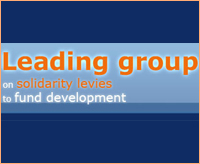
The sixth plenary meeting of the Leading Group on Solidarity Levies to Fund Development is taking place in Paris 28-29 May 2009. France, President of the Leading Group since the beginning of 2009, is hosting this year’s plenary with over 200 participants in attendance.
The meeting was opened by Mr Bernard Kouchner, French Minister of Foreign and European Affairs and Mr A. Joyandet, French Minister of State for Cooperation and Francophony. Mr Kouchner spoke of the need to implement innovation for development.
The United Nations and innovative financing
Dr Philippe Douste-Blazy, Special Advisor to the Secretary-General of the United Nations in charge of Innovative Financing spoke about the United Nations’ role in promoting innovative financing. The I-8 Group for the Millennium Development Goals held its first meeting in Geneva on 20 May.
This high-level conference marks an important step in international mobilization for these mechanisms before the next General Assembly of the United Nations in September, during which a report on innovative financing by the Secretary-General Ban Ki-moon will be made public.
Addressing the opening session, UNAIDS Executive Director Michel Sidibé argued that innovative financing could help bridge the gap between development needs and resources committed and build a more just, equitable and healthy world. He also called for innovative investing, in particular in HIV prevention.
Leading Group on Solidarity Levies to Fund Development
The Leading Group is an informal forum of 55 member countries. Since its foundation in 2006 it has become an important platform for discussion, sharing information and promoting innovative financing mechanisms. The Paris Conference aims to be one in a series of events to better regulate globalization. One of the topics it will explore is how the renewal of financial mechanisms can improve the quality of development and promote sustainable growth.
Right Hand Content
Speeches:
Speech by UNAIDS Executive Director Michel Sidibé (In French) 28 May 2009
Feature stories:
Innovative financing for development the goal of new I-8 Group (20 May 2009)
External links:

Feature Story
Report calls for urgent scale-up of MSM strategies to prevent HIV in Asia Pacific
28 May 2010
28 May 2010 28 May 2010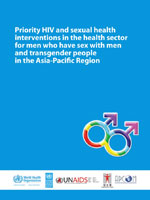
A report on HIV among men who have sex with men and transgender people in the Asia-Pacific region has called for urgent scale-up of strategies to prevent the transmission of HIV, and to ensure greater access to treatment, care and support for those already in need.
Titled “Priority HIV and sexual health interventions in the health sector for men who have sex with men and transgender people in the Asia-Pacific Region”, the report was developed after a meeting held in Hong Kong in February 2009, organized by WHO Regional Office for the Western Pacific, UNDP, UNAIDS and the Department of Health of Hong Kong.
The context of the report is important as it comes at the back of two similar reports—by the Commission on AIDS in Asia and by the Commission on AIDS in the Pacific—recommending that the control of the HIV epidemic in the region would imply focusing on the most-at-risk populations, including men who have sex with men (MSM) and transgender persons (TG).
The HIV epidemic among MSM and TG is escalating globally and in Asia, MSM are disproportionately affected by it, with the odds of MSM having HIV infection being 18.7 times higher than that in the general population, the report states. The Asian Epidemic Model projects that unless effective prevention measures are intensified, by 2020, around 46% of new infections in Asia will be among MSM, up from 13% in 2008.
The report lays great emphasis on repealing laws by parliament or decisions by courts that violate the constitutional rights of MSM. Male-to-male sexual behaviour remains a criminal offence in 18 Asia-Pacific countries, contributing directly to the stigma associated with male-to-male sex and driving MSM underground, making it more difficult for prevention programmes to reach them.
To counter difficulties in motivating health workers and reducing stigma and discrimination, the report recommends sensitizing health workers to work with people living with HIV, including MSM and TG; and recruiting MSM and TG into healthcare positions.
The report recommends for the involvement of MSM in community responses to HIV through self-organization. MSM should be given supportive access to the full range of services in which staff are sensitized to their issues and needs. Peer support and counselling should be actively encouraged, it states.
National health sector strategies and plans should call for the engagement of civil society and MSM and TG community based organisations in strategic planning, programme development, implementation, monitoring and evaluation.
Finally, the report recommends involving WHO, United Nations Development Programme (UNDP), UNAIDS, United Nations Educational, Scientific and Cultural Organization (UNESCO) and the Asia Pacific Coalition on Male Sexual Health (APCOM) in all aspects of planning, implementing, monitoring and evaluating health sector responses to HIV at the global, regional, national and local levels.
Report calls for urgent scale-up of MSM strategie
Key populations:
Cosponsors:
World Health Organization
United Nations Development Programme
Feature stories:
Punitive laws limit access to HIV prevention and care services in Asia Pacific (21 May 2010)
HIV prevention hampered by homophobia
(13 January 2009)
External links:
Department of Health of Hong Kong
Commission on AIDS in the Pacific
Publications:
Priority HIV and sexual health interventions in the health sector for men who have sex with men and transgender people in the
Asia-Pacific Region (pdf, 1.84 Mb.)
Turning the tide: An open strategy for a response to AIDS in the Pacific. Report of the Commission on AIDS in the Pacific (pdf,
1.52 Mb.)
HIV and Men who have Sex with Men in Asia and the Pacific (pdf, 1.11 Mb.)

Feature Story
Africa prepares to eliminate mother-to-child transmission of HIV by 2015
26 May 2010
26 May 2010 26 May 2010
Mother and baby in Lesotho Credit: UNAIDS/M. Hamman
In sub-Saharan Africa an estimated 60% of people living with HIV are women, mostly in the reproductive age group. In the absence of appropriate interventions, HIV infection in women translates directly to infant and child infections.
Each year approximately 1.4 million women living with HIV become pregnant. Among antenatal clients in sub-Saharan Africa, the proportion of women living with HIV ranges from 5% to as high as 30%—and HIV among childbearing women is the main cause of infection among children.
More than 90% of infant and young child infections occur through mother-to-child transmission, either during pregnancy, labour and delivery, or breastfeeding. Without intervention, about one in three children born to mothers living with HIV will become infected.
In 2008, 430,000 children were newly infected with HIV, 90% of whom lived in sub-Saharan Africa. Most of these children, in the absence of access to antiretroviral treatment will die within one year of birth. Those who survive often lose their parents, if they too do not have access to antiretroviral therapy.
However the lives - of mothers and their babies—can be saved, through a combination of HIV testing and counselling, access to effective antiretroviral prophylaxis and treatment, safer delivery practices, family planning, and safe use of breast-milk substitute.
Investments made to protect mothers from HIV and babies from becoming infected is a moral responsibility of all governments.
Michel Sidibé, UNAIDS Executive Director
UNAIDS Executive Director Mr Michel Sidibé has called for the elimination of mother-to-child transmission of HIV by 2015. Africa is responding to this call. This week more than 200 participants from 20 countries with the highest burden of infections among pregnant women are meeting in Nairobi to chart out a a course of action to the needed HIV services.
At the heart of the plan is to mobilize resources. UNAIDS, UNFPA, WHO, UNICEF and the Global Fund to Fight AIDS, TB and Malaria (Global Fund) are co-convenors of this meeting will be providing technical support to these countries in building their capacities to develop sound business plans that can be funded.
“Africa‘s leaders are becoming serious about protecting their future generations,” said Michel Sidibé. “Investments made to protect mothers from HIV and babies from becoming infected is a moral responsibility of all governments.”
The Global Fund is an important source for these resources. It has committed to working with countries and other partners to ensure that at least 80% of Global Fund supported prevention of mother-to-child transmission (PMTCT) programmes meet the requisite levels of efficacy and quality by December 2010. The Global Fund has also committed to accelerate the scale up of PMTCT programmes and extend coverage to at least 60 per cent of women in need globally by the end of 2010.
A first step is to help countries reprogramme their existing grants to improve the effectiveness of the current programme strategies as well re-direct resources from savings and efficiency gains. The second step is preparing countries to make quality submissions to the Global Fund’s round 10 call for applications.
Many countries are already doing so. Ethiopia, having identified low antenatal coverage as a bottleneck to PMTCT utilization, is using its US$ 600 million grant to strengthen its maternal and child health services. South Africa has used the reprogramming opportunity to strengthen the participation of civil society in the PMTCT reprogramming exercise. Nigeria is using its reprogramming opportunity to strengthen broad program coverage and set more ambitious targets, much needed as Nigeria has the largest PMTCT burden globally. Zambia and Ghana also raised US$ 3 million from the Global Fund.
UNAIDS together with its Cosponsors UNICEF and WHO have facilitated such reprogramming in Tanzania which helped the country to mobilize an additional US$ 2.2 million for the country’s PMTCT programme. As a result the country increased its target coverage to 70%.
Africa prepares to eliminate mother-to-child tran
Cosponsors:
Partners:
The Global Fund to fight AIDS, Tuberculosis and Malaria
Feature stories:
UNAIDS and Private sector meet to explore collaboration towards virtual elimination of mother-to-child transmission (16 March 2010)
Global Fund projects that UNAIDS’ call for elimination of mother–to-child HIV transmission by 2015 is within reach (08 March 2010)
Data shows progress needed on HIV testing and treatment for children and mothers (30 November 2009)
Partnering with faith based organizations for virtual elimination of mother to child transmission of HIV (14 October 2009)
More infants protected from HIV as access to antiretroviral drugs to prevent mother-to-child transmission increases (30 September 2009)
Early diagnosis and treatment save babies from AIDS-related death (27 May 2009)
Related

Feature Story
Punitive laws limit access to HIV prevention and care services in Asia Pacific
24 May 2010
24 May 2010 24 May 2010This story was first published on UNDP.org
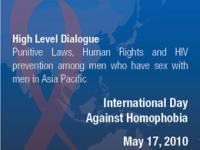
More than 90 per cent of men having sex with men (MSM) in the Asia-Pacific region do not have access to HIV prevention and care services due to an adverse legal and social environment. If countries fail to address the legal context of the epidemic, this already critical situation is likely to become worse. The implementation of effective, human rights-based national HIV responses requires governments to consider the effect of laws and law enforcement practices on the health of men who have sex with men (MSM) and transgender persons.
A high-level forum on punitive laws, human rights and HIV prevention among MSM in the Asia-Pacific region was convened by the UN Development Programme (UNDP), the Asia Pacific Coalition on Male Sexual Health (APCOM) and the Centre for Comparative and Public Law (CCPL) at the University of Hong Kong. They were reviewing the findings of an upcoming report.
The study, “Laws affecting HIV responses among men who have sex with men and transgender persons in Asia and the Pacific: an agenda for action,” notes 19 of 48 countries in the region criminalize sex between men, with laws often taking on the force of vigilantism leading to abuse and human rights violations. Of the 192 member states of the United Nations, 85 have laws that still criminalize homosexual behaviour and, in some of these countries, conviction can even result in the death penalty.
On the occasion of International Day Against Homophobia, UNAIDS Executive Director Michel Sidibé said, “I salute the dedication and efforts of lesbian, gay, bisexual and transgender communities to demand their rights. Change is happening from exclusion to inclusion, from stigma to dignity but not everywhere ... I call on all governments to create to create social and legal environments that ensure respect for human rights.”
I call on all governments to create to create social and legal environments that ensure respect for human rights
UNAIDS Executive Director Michel Sidibé
At the gathering in Hong Kong, Mandeep Dhaliwal, UNDP Cluster Leader on Human Rights, Gender and Sexual Diversity, said, “The development and strengthening of an enabling legal and social environment is critical for comprehensive interventions for men who have sex with men and transgender people to have the greatest impact.”
At least 5–10% of all HIV infections worldwide are due to sexual transmission between men, though this figure varies within countries and between regions considerably. In Asia, men who have sex with men are disproportionately affected by HIV. It is estimated that HIV prevalence is as high as 14% in Phnom Penh, Cambodia; 16% in Andrha Pradesh, India; and 28% in Bangkok, Thailand.
Men who have unprotected sex with men may also have unprotected sex with women and thus serve as an epidemiological bridge for the virus to the broader population. For example, a survey of over 800 men in China who have sex with men found that 59% reported having had unprotected sex with women in the previous year.
HIV transmission prevention programmes addressing men who have sex with men are therefore vitally important. However, this population is often seriously neglected because of official denial by governments, the relative invisibility of men who have sex with men, stigmatization, ignorance or lack of adequate information.
In some cases, men who have sex with men are neglected due to reluctance by individuals and organizations to work with them. In many countries, prevention efforts are hindered by laws that criminalize male-male sex, making work with men who have sex with men difficult and hindering their contribution to the response to the epidemic.
Even in the absence of criminalization, other provisions of law often violate the rights of those concerned, thereby obstructing HIV interventions, advocacy and outreach, and service delivery. Moreover, legislation and law enforcement often lag behind national HIV policies, undermining the reach and effectiveness of programmes for men who have sex with men.
This indicates the need for greater coordination between health and justice sectors within government, the report stresses. It highlighted some recent examples of protective laws, judicial and policy actions to improve the legal environment for the men concerned, including important court judgments in Fiji, India, Hong Kong, Nepal, Pakistan, Philippines and the Republic of Korea.
But these are exceptional developments and action is required to improve the legal environment in all countries, it warned.
The final report of the study’s findings will be delivered at the XVIII International AIDS Conference, Vienna, at the session on Criminalizing Homosexual Behaviour: Human Rights Violation and Obstacles to Effective HIV/AIDS Prevention, 20 July 2010.
Punitive laws limit access to HIV prevention and
Key populations:
Cosponsors:
United Nations Development Programme (UNDP)
Multimedia:
Video message from UNAIDS Executive Director
Feature stories:
International Day Against Homophobia (17 May 2010)
China to tackle HIV incidence amongst MSM (16 January 2009)
Focused AIDS programmes in Asia and the Pacific (21 March 2007)
External links:
Asia Pacific Coalition on Male Sexual Health
Centre for Comparative and Public Law
Publications:
HIV and Men who have Sex with Men in Asia and the Pacific (pdf, 1.1 Mb.)
AIDS Epidemic Update 2009 (pdf, 2.90 Mb.)

Feature Story
UNDP’s Administrator Helen Clark concludes four-country Africa tour
21 May 2010
21 May 2010 21 May 2010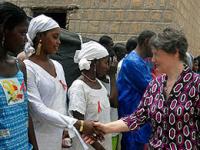
Helen Clark meets with beneficiaries of an HIV project in Timbuktu. 04 May 2010. Credit: UNDP
The Administrator of the United Nations Development Programme (UNDP) Helen Clark recently ended a four-country tour of Africa to highlight progress towards the Millennium Development Goals (MDGs) in the run-up to the MDGs Summit in September 2010. Ms Clark travelled to Mali, Burkina Faso, Tanzania, and South Africa.
“Achieving the MDGs means quite simply a better life for billions of people,” Helen Clark said. “...Reaching the Millennium Development Goals is possible, and there is a range of tried and tested policies which ensure progress, particularly when backed by strong partnerships.”
UNAIDS participated in one leg of the tour as part of a joint mission with UNDP. UNAIDS Executive Director Michel Sidibé accompanied Ms Clark to Mali on a four-day mission where he reiterated his call for preventing HIV transmission from mothers to children. "I am honoured to join Helen Clark on her first visit to Mali, which is a clear sign of the UN's commitment to reach zero new HIV infections," Mr Sidibé said.
Ms Clark met with Heads of State and Ministers, touched base with women leaders and members of civil society, and visited development projects.
Mali has been making important headway in tackling the AIDS epidemic, having reduced national prevalence from 1.7% in 2001 to 1.3% in 2006 and dramatically expanding universal access to HIV services.
Ms Clark also reiterated the importance of empowering women to achieving the Millennium Development Goals, describing “economic empowerment, access to legal rights, including inheritance rights, and participation in decision-making” as key steps toward achieving women’s empowerment.
In Burkina Faso, she toured a project which facilitates access to energy for rural women, and visited one of 176 UNDP-supported AIDS community associations where she spoke with sex workers about their concerns for the future.
The prevalence rate of HIV in Burkina Faso has dropped from 7% in 2002 to 1.6% in 2008, one of the lowest in West Africa. Despite this progress, the country still faces an epidemic mostly affecting women between 15 and 24 years old.
In Tanzania, Ms Clark met with the Minister for Finance and Economic Affairs, Mustafa Mkulo, to discuss the country’s progress towards the MDGs, particularly on the AIDS response, empowering women, and enrolling children in primary school. She also travelled to Zanzibar and visited the Jozani-Chwaka Bay Conservation Area, the single most important site for the conservation of the island’s biodiversity.
Ms Clark toured the National Electoral Commission’s voter registration facilities where she spoke to first-time voters planning to take part in the national elections this October. UNDP’s support to Tanzania’s election process includes voter education, training for media and political parties, and training domestic observers.
In the last leg of her Africa tour Ms Clark visited South Africa, where she launched an MDGs campaign song in Johannesburg for the 2010 FIFA World Cup, "8 Goals for Africa". The song encourages commitment to the achievement of the MDGs.
“There can be no spectators in the fight against poverty,” she said at the launch. “Everyone has a role to play in scoring the 8 Millennium Development Goals, which if reached would improve the quality of life for hundreds of millions of people across developing countries.”
Ms Clark ended her four-country tour of Africa by launching the second annual Picture This photo contest in Johannesburg in partnership with Olympus Corporation and the Agence France-Presse (AFP) Foundation. The contest, titled Picture This: We Can End Poverty, seeks to show the inspirational work that is being done in many countries to achieve the MDGs.
“Through the photo contest this year we want to show that the MDGs can be reached, even in the poorest and most disadvantaged countries,” Ms Clark concluded.
UNDP’s Administrator Helen Clark concludes four-c
Cosponsors:
Multimedia:
Photo gallery - Joint mission by UNDP and UNAIDS to Mali
Feature stories:
First joint mission by UNDP and UNAIDS to Mali (4 May 2010)
Joint Mission to Mali Concludes (6 May 2010)
Related

Feature Story
A mother’s joy, a mother’s challenge: Cameroon copes with mother to child HIV transmission
21 May 2010
21 May 2010 21 May 2010
UNAIDS Executive Director Michel Sidibé visited the outpatient clinic and maternity ward at Yaoundé’s central hospital. 19 May 2010.
After almost ten years, 28-year old Angele is a mother again. “My daughter is my joy. She is such a wonder,” said the young woman who wishes to keep her identity a secret as she is living with HIV in Oug-ebe, a shantytown in Yaoundé, Cameroon.
She found out she was HIV-positive in 2001 when she underwent a test at the time of her first pregnancy. Even though she took antiretroviral treatment to prevent HIV transmission to her fetus, her baby was born HIV-positive and died after nine months from an AIDS-related illness. “They told me that I was in a highly infectious stage when I was pregnant so the drugs didn’t work. I was devastated. Only after almost ten years, when I heard the science had improved did I get pregnant again," said Angele.
And her gamble paid off with a gift: Crissile (not real name) a healthy baby girl who is HIV free. While Angele savours each moment with the playful toddler, she confesses that she still lives with a shadow of doubt. “I always worry that maybe the diagnosis was wrong. They say the test isn’t always right”.
An addition to that gnawing concern is her daily struggle with stigma and discrimination. During the interview, she nervously closes the window and shuts her door, to keep her disclosures from curious neighbours. “We rent this place and if the neighbours found out I was HIV-positive, I might get kicked out of my home,” said Angele.
At the moment she is a volunteer in an outpatient clinic in Yaoundé’s central Hospital, but has no job and relies on her family for support.
Over the past ten years the clinic, which provides care management and treatment for HIV patients, has seen a lot of progress. Last year, it treated more than 26-thousand HIV patients and put more than 6000 on antiretroviral therapy. “I think discrimination has gotten better, but we still mask what we do by also saying we treat skin diseases, so our HIV patients have a cover,” said the centre’s director, Dr Charles Kouanfack.
Cameroon has led the way in Africa in decentralizing its AIDS response. Now almost all health districts are equipped to prevent mother-to-child HIV transmission (PMTCT). While coverage of treatment to prevent babies from getting HIV reached almost 34% of pregnant women living with HIV in 2009, a vast improvement from the 18 % of 2008, the country still has a long way to go. Dr Kouanfack says while health districts have reached almost their maximum level of PMTCT coverage the problem is that many women do not go to hospitals and clinics to give birth. Pregnant women in rural and marginalized communities will have their children at home with a mid-wife. So, the next step would be to implement strategies to reach out to vulnerable women.
However, ramping up HIV coverage has had other benefits. “The resources which have gone to HIV treatment have also helped improve the capacity of health systems in general. We see that ameliorating the management of HIV has helped increase the professionalism of our laboratories and medical staff,” said Dr K Kouanfack.
UNAIDS Executive Director Michel Sidibé has championed the prevention of mother to child HIV transmission. He has made the eradication of babies born with HIV a top priority. “It is not acceptable that in countries like France or the US practically no pregnant HIV positive women give birth to babies with HIV, but in places like Cameroon, still far too many babies are born with HIV,” said Mr Sidibé. “This kind of inequality is intolerable. We know we can stop mother to child transmission of HIV, so we must continue to redouble our efforts to overcome this injustice.”
He visited the HIV treatment centre and maternity ward at Yaoundé’s central hospital this week and praised the efforts Cameroon has made to eradicate the transmission of HIV from mother to child. But he called on the leadership to continue to expand prevention measures and become a model of PMTCT in Africa.
A mother’s joy, a mother’s challenge: Cameroon co
Multimedia:
Feature stories:
African nations celebrate 50th anniversary (20 May 2010)
International conference begins in Cameroon (17 May 2010)
UNDP to partner with Sony and JICA in Cameroon and Ghana during FIFA World Cup (30 March 2010)
New wave of cooperatives in Cameroon help HIV-positive women gain economic independence (25 February 2010)
UNAIDS, Universal Postal Union, UNI Global Union and ILO launch global HIV prevention campaign (07 July 2009)
Publications:
Joint Action for Results: UNAIDS Outcome Framework (2009–2011) (pdf, 932 Kb.)

